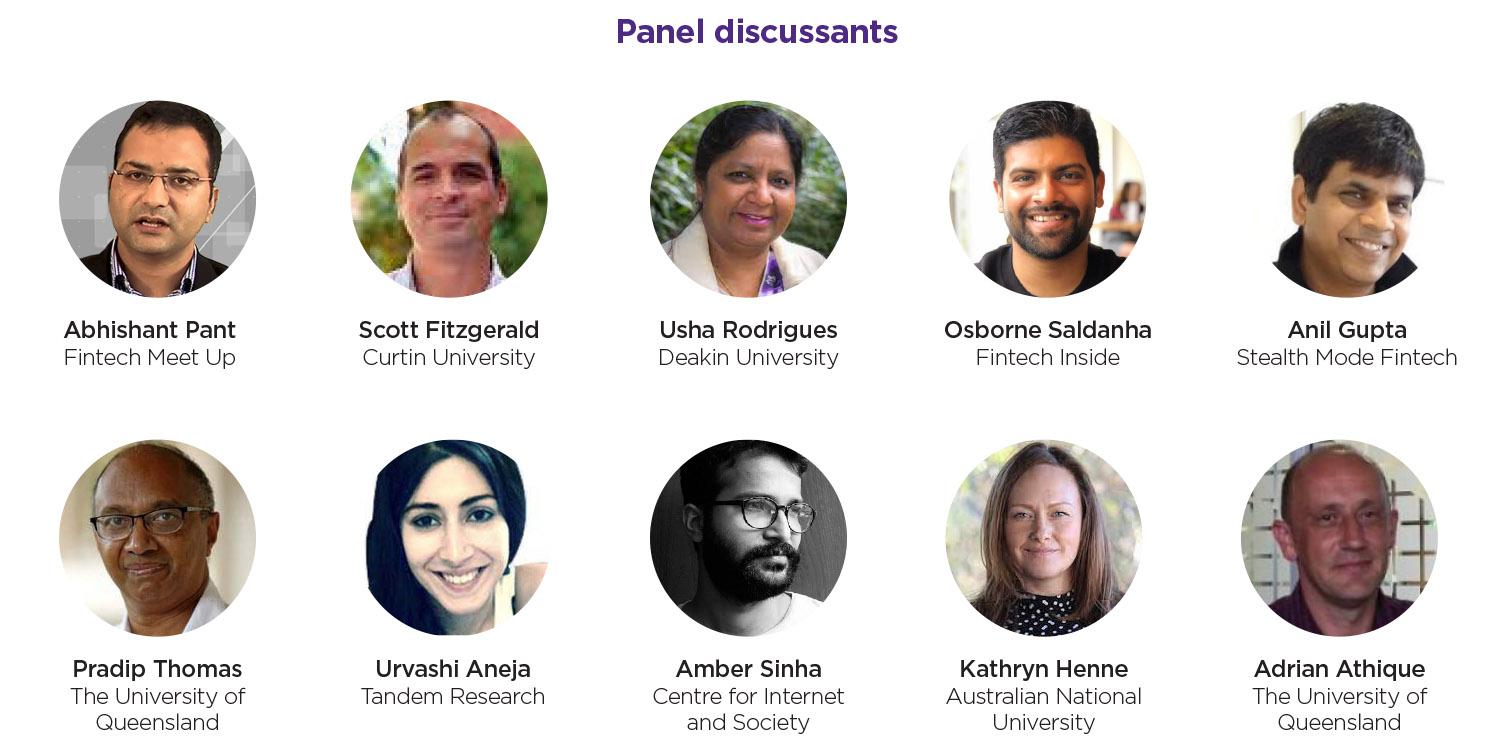This two day event brought leading figures in India’s Fintech sector into conversation with Australian scholars focusing their research on digital transactions in India and the wider international significance of India’s digital agenda. These experts zoomed in on current debates over the financial, social and economic regulation that will determine the form of India’s digital environment in coming decades.
Watch the presentations
Day 1 - Session One: India: Fintech and Financial Inclusion
Introduction: Digital Transactions in India
Adrian Athique - University of Queensland
Panel Presentations:
Anil Gupta - Stealth Mode Fintech
Osborne Saldanha - Fintech Inside
Abhishant Pant - Fintech Meet Up
Session Two: Big Tech and Platform Regulation
Introduction: Regulation and Equalisation in the Digital Economy
Pradip Thomas - University of Queensland
Panel Presenters:
Urvashi Aneja - Tandem Research
Amber Sinha - Centre for Internet and Society
Scott Fitzgerald - University of Western Australia
Day 2 - Session Three: State Governance in a Digital India
Introduction: The Indian State's Approach To Nagoya: Compliance Through Technological Design Allison Fish, University of Queensland
Panel Presenters:
Kathryn Henne and Franz Carneiro Alphonso - The Australian National University
Usha Rodrigues - Deakin University
Siddarth Narrain - University of New South Wales
Session Four: Digital Transactions in Everyday Life
Women’s Mobile Phone Access And Use Patterns in India
Anubhatie Singh and Srikara Prasad - DVARA Research
Closing Remarks / Q&A
Our final session featured an open discussion on critical research questions, challenges and opportunities for India at a time of technological, economic, political and biological upheaval.
Panel:
- Adrian Athique - University of Queensland
- Allison Fish - University of Queensland
- Vigneswara Ilavarasan - IIT Delhi
- Pradip Thomas - University of Queensland
The Asian region as a whole is passing through a period of unprecedented social, economic and political change, and digital platforms operate at the centre of these processes. In India, the evolution of digital architecture is seen as the primary means for ensuring that the digital switchover yields equitable benefits, and that India’s digital economy achieves trajectories of sustainable growth and key goals in financial inclusion. This switchover to digital transactions is key for the realisation of a Digital India, the goal of a central government campaign launched in 2015.
However, the path to Digital India has not always been smooth, a fact that is most starkly exemplified by the seismic shock of demonetisation in November 2016. Since this time, the digital payments sector in India grown and evolved across a range of applications, processes and services. Moreover, India’s transaction architecture has further expanded across new domains including; e-commerce, personal finance, micro credit, welfare system, social media apps, and even scientific research dissemination - all platforms that are central to social and economic life during the COVID pandemic.
Despite the clear utility of these mechanisms, there are significant and continuing obstacles to realising the vision of a cashless and fully Digital India that is effective, transparent, accountable and inclusive. As a result, the domestic start up sector in India is growing rapidly and seeking to develop key innovations in financial inclusion and social development frameworks capable of operating across this vast and diverse nation and serving what is one of the largest user markets for major transnational platforms.

For further information, please contact Dr Allison Fish, UQ Centre for Policy Futures:
e-mail: a.fish@uq.edu.au or phone: 07 3443 3118

This Event Was Funded By
This event is made possible through the generous support of the Australia-India Council, Department of Foreign Affairs and Trade (AIC 2019073).
Organized by
Adrian Athique, School of Communication & Arts
Allison Fish, Centre for Policy Futures
Pradip Thomas, School of Communication & Arts
Beck Hurst, Institute for the Advanced Studies of the Humanities
Jennifer Yarnold, Centre for Policy Futures
Sponsored by
Centre for Communication & Social Change
School of Communication & Arts
Institute for the Advanced Studies of the Humanities
Centre for Policy Futures
